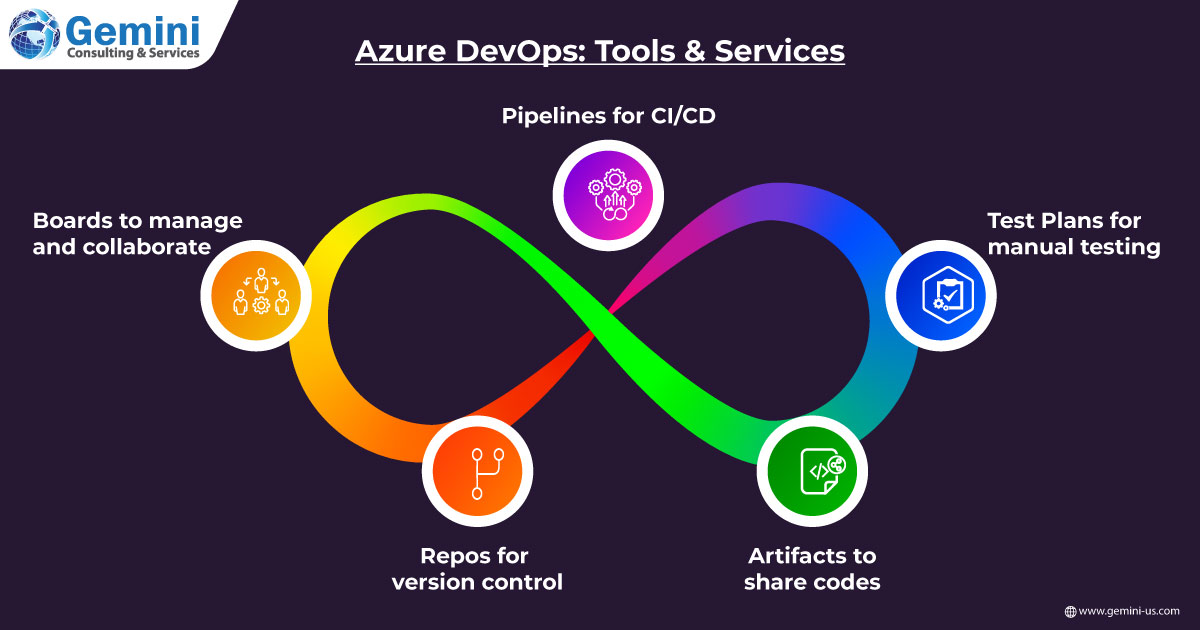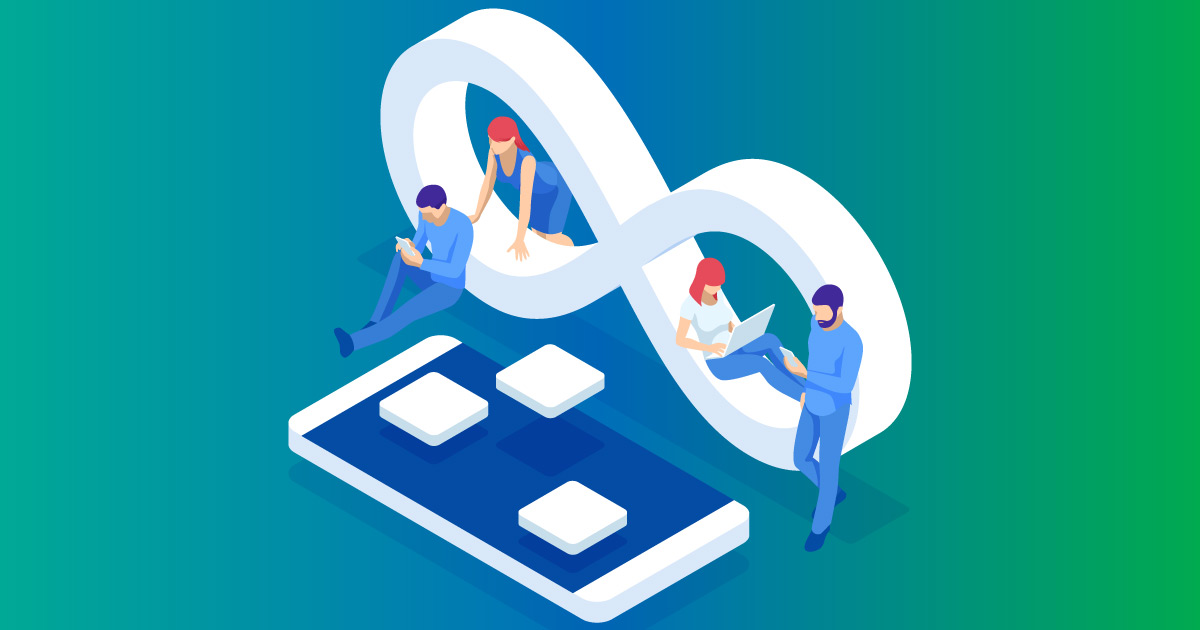Microsoft Azure, equip developers with the right tools that help build sophisticated development, deployment, and operations in DevOps pipelines. To gain maximum value from Azure, DevOps teams must have an adequate understanding of the tools offered by the cloud provider. They should also know the best practices to follow while working on Azure to minimize security risks and maximize benefits.
Azure DevOps is an application development service suite that helps DevOps teams to plan workflows, collaborate for code development and then deploy them. It promotes a seamless work culture supporting DevOps processes and unites the efforts of project managers, developers, and other contributors. Azure DevOps facilitates Organizations to create, publish, and modify products/applications and reduces the time taken for releasing new updates or products. Azure DevOps Services support cloud-based software development workloads and the Azure DevOps Server helps handle on-premise workload.
Why Do Enterprises Require DevSecOps?
Ensuring security at the start of developing codes accelerates the progress of business operations and by adopting the DevSecOps approach enterprises can prevention potential security risks and protect their applications/ infrastructure from vulnerabilities. It is an agile practice that can help an organization adapt to changes while being able to handle budget constraints and security planning issues.
Markets and Markets predicts that the DevSecOps market is expected to register a CAGR of 31.2% and reach $5.9 billion in 2023 from $1.5 billion in 2018.
Although DevSecOps grew out of the DevOps movement it continues to build upon the framework. Understanding the differences between DevOps and DevSecOps forms the foundation of software and application development. While both practices share similarities, they are meant to address different business goals.
Similarities Between DevSecOps & DevOps
DevOps and DevSecOps make use of automation and active monitoring. They aim to improve business operations by bringing together teams across the business.
DevOps and DevSecOps focus on the community. They unite multiple departments to create products/applications. DevOps helps promote efficiency and reduces bottlenecks whereas DevSecOps incorporates cloud security at all phases and minimizes vulnerability by improving compliance.
As both practices are similar, they require similar tools to function. Azure DevOps promotes a development and operations process that integrates security into all stages of the development lifecycle.

- Azure Boards are useful for large development teams that manage and collaborate on software projects. It not only supports processes based on agile, scrum, and Kanban methodologies but also provides calendar views and configurable dashboards and consolidates reporting across multiple projects.
- Azure Repos is a version control system that helps developers manage their work on a codebase. It helps track code changes, save work executed, and coordinate code changes across a team. Repos can also take a snapshot as developers work on code, useful to recall when needed.
- Azure Pipelines automatically builds and tests code projects across languages, project types, open source, or commercial software projects. It provides a full Continuous Integration and Continuous Delivery (CI/CD) pipeline to test, build, and deploy code to any location.
- Azure Test Plans allows software development teams to coordinate and manage manual testing efforts while improving development quality throughout.
- Azure Artifacts helps developers to share code and manage all packages in one location. Developers can publish packages to a feed and share them within their teams or across the organization. Similarly, developers can access packages from feeds created by their peers or organizations, and public registries like NuGet.org and npmjs.com.
These tools and services are used for building DevSecOps pipeline.
Additional Features that Enable DevSecOps on Azure
- Bridge to Kubernetes replaces the Dev Spaces tool. It aids Kubernetes application development as developers can run containers and debug code using it. Most developers need to manage multiple development and testing tasks simultaneously while accessing Kubernetes and Docker configuration files for different services. With Bridge to Kubernetes, developers run code and debug issues on their own machines, effectively connecting them to the Kubernetes cluster that hosts other services/ application components.
- Microsoft Identity Platform is an IAM service based on Azure Active Directory (Azure AD) used by developers to create applications using Microsoft identifies to sign, with tokens to make Microsoft API calls. Customers can access all apps and APIs via single sign-on using their social, local, or enterprise account identities using Azure Active Directory B2C.
- Azure Role-Based Access Control (Azure RBAC) further facilitates access permission management and provides greater control over user access to Azure resources.
- Azure Key Vault is a secret key centralized management service for organizations to securely store and manage access to all kinds of confidential information. It reduces the risk of accidental exposure, allowing developers to use secrets needed to store security data within the application.
- Azure Policy facilitates Azure platform’s cloud hardening capabilities. Azure Policy helps administrators tweak default settings for cloud deployments while ensuring that configurations align with overall organizational policies. It provides alerts, blocks or remediate deployment and offers enforcement environments as an integral part of the Azure tenant subscription plan. DevOps teams eventually mature over time and can begin to incorporate security into daily operations. They can leverage Azure Advisor and Security Centre services apart from Azure Policy to enhance the strength of the security.
Enterprises can prioritize and ensure that security compliances are in place by establishing a culture of DevSecOps. Gemini Consulting & Services can help you develop this kind of integrated approach to security and bring in better accountability. DevSecOps is a journey that changes with the requirements of a development project. Contacts us to integrate security into your software development lifecycle.

Benefits of DevSecOps
- Developing software in a non-DevSecOps environment creates security issues that are highlighted later in the SDLC cycle leading to time delays, drain on resources etc. It saves time and brings down costs as there is almost no need to repeat a process to address security issues. Integrated security eliminates duplicate reviews and unnecessary rebuilds, resulting in more secure code.
- DevSecOps improves the security structure of the entire system from the beginning of the development cycle through periodic reviews, scans, and audits. It enforces better collaboration between development, security, and operations teams thus improving response times to incidents when they occur.
- It unites all stakeholders in the organization on the company’s stance on security and eases collaborative efforts to build more secure systems in turn helping build customer trust. Consistent security breaches cause loss of customers due to loss of trust in a product with breached security.



